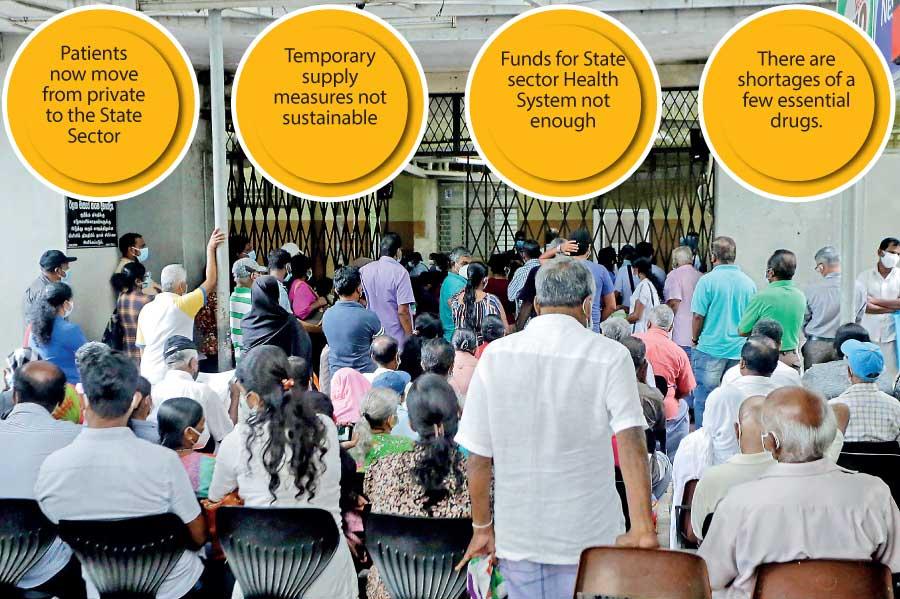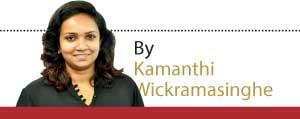Reply To:
Name - Reply Comment
Last Updated : 2024-05-04 08:03:00

Medics are of the view that more patients are now migrating from private clinics and hospitals to government medical care facilities considering the latter as a cheaper option.
Sandya Kumari from Kotahena has been experiencing chest pains since 2015 and the doctor has recommended bypass surgery. But she has been unable to get the test done before a bypass surgery, which should have been done within six months. Even though she received a date for earlier this month, her opportunity was missed near the examination room. It was at that instance, she found out that her name had been struck out and another patient had been given the opportunity. The next date given to her is in April but she feels that it will be too late. Apart from languishing on waiting lists, patients have been burdened with the soaring cost of medicines, drugs and devices and the shortage of basic medicines for over a year.

Medical experts foresee a worsening crisis if health authorities don’t provide immediate solutions. Authorities on the other hand affirm that the prevailing health crisis would be fully resolved by March. But from a medical point of view, time is life.
Patients inconvenienced
Medics are of the view that three aspects including stewardship, resources and funds need to be managed if the health crisis is to be resolved. They have also pointed out issues in leadership.
“In 2006 there were moves to privatize the health sector and as a result, there was a boom in the number of private hospitals in the country,” said Dr Jayantha Bandara, Secretary, of All Ceylon Medical Officers Association.
“Before that, around 85% of in-ward patients got admitted to Government hospitals. But there was a 50-50 attendance in private dispensaries and OPD clinics.”
In terms of funds, Sri Lanka is listed among the 20 countries in the world that allocate the least amount of funds to the health sector.
“In fact, the amount of funds allocated to the sector has been deteriorating by the year,” he underscored.
Concerns have also been raised about manpower, drugs and devices. The Government has planned to reduce the workforce in Government institutions and this applies to the Government health sector as well.
“This decision will adversely impact the health sector which has more or less already collapsed. There’s a dearth of specialists. The recruitment of doctors doesn’t happen frequently anymore. We are experiencing a brain drain where specialists opt for migration seeking better employment opportunities overseas. But even though they migrate, they have to work an additional two years in order to get a license in that particular country.”
However, medical experts have been raising concerns about the shift in patients from private medical care clinics to Government clinics due to the soaring cost of medicines, drugs and devices for quite some time.
“The Government should prioritise the health sector while settling other expenses. The Government sector is unable to meet the supply and demand. Around 700,000 people are reportedly on waiting lists to get cataract surgery done. This is the same when it comes to patients awaiting bypass surgeries. Patients who seek medical care in the private sector have to spend out of their pocket. One reason for the Government sector to fail is that they cannot bear the expenses. It costs around 10-15 lakhs to do bypass surgery. But people don’t have savings and therefore they cannot afford it. Even doctors’ fees have been increased now. People cannot even afford to get a diagnosis done as they cannot allocate their savings for health anymore,” he added.
Medicines out of stock
As a temporary measure, the previous regime relied on credit lines to procure essential medicines from India. But such approaches and donations are seen as unsustainable, short-term measures.
“Initially, the medicines given to in-ward patients were compromised due to the drug shortage. This then trickled down to the clinic level for a longer duration. Patients who received medicine for two months only received medicines sufficient for two weeks. Now this crisis has penetrated the OPD level as well. “There’s a severe shortage of basic painkillers such as paracetamol, Cetirizine, medicines prescribed for phlegm and respiratory diseases, and gastritis. Even insulin and aspirin are reportedly out of stock. As such around 150 drugs are currently out of stock,” Government Medical Officers Association spokesperson Dr Chamil Wijesinghe said.
Explaining the situation at present, he said that stocks of 14 lifesaving drugs are still at a manageable level.
“There are around 1,300 drugs in the system and we are short of many drugs. Ideally, the Medical Supplies Division should have stocks for three months. This crisis has affected all hospitals from National Hospitals down to rural hospitals and primary medical care centres. At the moment we’re continuing emergency care as usual but there’s a delay in conducting routine surgeries. If a patient arrives on the date given to him, he’s most likely to be sent away due to the shortage of drugs and devices. Therefore this crisis has a huge social impact as well.”
The darker side to this crisis
“In certain drugs, the prices have increased from 100-600%. Even though there are 1300 drugs, the legal price control only applies to around 100 drugs. Prices of drugs in the private sector have increased by 2-3 folds. An eye drop costs between Rs. 3000-5000. Cost of placing pacemakers, valves too have soared mainly due to the lack of equipment.”
Dr Wijesinghe said that there are four categories of pharmaceutical drugs and devices including pharmaceuticals which include tablets and capsules; consumables, X-Ray items such as chemicals, MRI scanners, radiology equipment and lab items for blood and urine investigations and so on.
“All these categories have been affected and certain hospitals have even limited taking full blood count which is the most basic blood investigation conducted in hospitals. There have been issues in administration and a lack of inefficiency. The procurement system takes too long to process and all these matters have added to the crisis at hand. What would perhaps come next is the approval for emergency purchases and there will be no price controls,” he warned.
More patients seeking cheaper options 
“In 2018, 6.4% of Sri Lankan households fitted into the definition of Catastrophic Health Expenditure – a measure of the burden of health care expenditure (or out-of-pocket costs) on a household’s available resources,” said former Sri Lanka Medical Association President and family physician Dr Ruvais Haniffa.
“Given the current economic circumstance at national and household levels, this figure of 6.4% I think is very much more now. That is why I am seeing upper and lower-middle-class families who earlier sought private ambulatory curative primary care being unable to afford even primary care in the private sector anymore.”
He has been witnessing the migration of patients from the private sector to the Government for some time.
“But, due to the politician and bureaucrat manufactured political and economic catastrophe engulfing the country at the national and individual level, more patients than ever before are forgoing private medical care not entirely of their own free will to seek medical care in the Government sector.”
“Almost 50% of OPD care in Sri Lanka has been occurring in the private sector. Demand-driven and voluntary utilization of the private sector are observed among the higher-income groups. Supply-side constraints in the state sector may also be pushing persons, including poorer households, to utilize the private sector. The trend that has been seen now is that even the higher-income groups are unable to afford medication and consultation fees for even doctors providing basic primary OPD care and are seeking OPD care in the state sector.
“We have not formally conducted any studies to quantify this observed migration, but anecdotally using my practice as a benchmark I would say that about 15-20% of my middle and high-income patients are now seeking care in the state sector OPDs in around Colombo.
With regards to patients seeking in-ward care, the traditional scenario has been over 90% of in-ward care occurs in state hospitals. In-ward care in the private sector has always been at best only ‘just affordable’ by those who seek it. The vast majority of private in-ward care consumed by patients are covered by Insurance schemes to which at best of times was/is out of reach of the poor.”
He said that one of the key concerns that should be addressed at the policy level should be to respond to the increasing burden of NCDs, including mental health, cancer and injuries as well as the healthcare needs of an ageing population, while also addressing the health needs of young persons.
“The policy, through integration at the primary care level, will offer opportunities for unresolved health challenges such as controlling TB and malnutrition. This envisages the provision of quality first-contact care through strengthening primary-level curative services with a special focus on NCDs. A patient- and family-centric approach would be used, and continuity of care ensured. An Essential Services Package for Sri Lanka has been developed, which describes the services to be delivered in all primary medical care settings.
“A multisectoral action plan for the prevention and control of NCDs, formulated in 2016, underpins some of these reforms,” he added.
Crisis to be resolved ASAP: official
Drugs are categorized as lifesaving, essential and so on. Dr D. R. K Herath, Deputy Director General at the Medical Supplies Division said that even though all lifesaving is available at the moment, there are shortages of a few essential drugs.
“We are planning to procure these drugs within the next 2-3 weeks. There’s an issue about suppliers as a result of the prevailing economic crisis. For instance, there’s a shortage of cancer drugs and we have held discussions with the Director General of Health Services, State Pharmaceutical Corporation and the Medical Supplies Division to seek the possibility of procuring these drugs via an alternative method. This would affect the usual suppliers.”
Dr Herath further said that the stability of suppliers is important at this moment. “Otherwise we will have to work with new suppliers.”
When asked if there’s a risk of opting for emergency purchases he said that emergency purchases are happening at the moment as well. “If a patient needs a drug, it’s our responsibility to ensure that that drug is available in the market,” he underscored.
Name withheld on conditions of anonymity
Sangaralingham Monday, 23 January 2023 10:00 PM
No wonder crisis in health care seems across the globe.why lack of proper planning.rising populations fault administration. Political and leadership crisis.lack of proper funding.failure of public to educate personal health matter sanitation diet e exercise emotional well-being.

Add comment
Comments will be edited (grammar, spelling and slang) and authorized at the discretion of Daily Mirror online. The website also has the right not to publish selected comments.
Reply To:
Name - Reply Comment
US authorities are currently reviewing the manifest of every cargo aboard MV
On March 26, a couple arriving from Thailand was arrested with 88 live animal
According to villagers from Naula-Moragolla out of 105 families 80 can afford
Is the situation in Sri Lanka so grim that locals harbour hope that they coul

03 May 2024